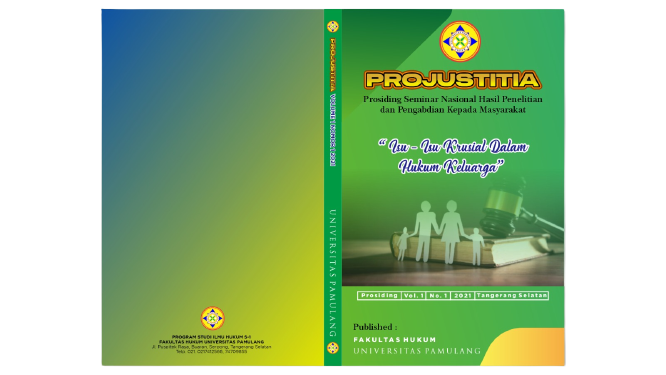DAMPAK ZINA DAN STATUS HUKUM ANAK YANG LAHIR DI LUAR PERKAWINAN BERDASARKAN HUKUM ISLAM DAN KUHPERDATA
Abstract
Abstrak
Artikel ini akan membahas mengenai peristiwa lahirnya anak manusia yang dihasilkan dari suatu hubungan yang tidak berdasarkan ikatan perkawinan yang sah akan berdampak pada kedudukan anak tersebut berdasarkan Hukum Islam dan KUHPerdata, yang dalam ilmu hukum perdata dikenal dengan anak haram atau anak di luar nikah. Anak yang lahir di luar nikah berdampak negatif bagi anak di mata hukum terutama pada KUHPerdata. Status anak yang dilahirkan akan menjadi tidak pasti karena tidak ada bukti otentik yang menguatkan bahwa dia adalah anak sah dari orang tuanya, kedudukannya di mata hukum juga dianggap sebagai anak haram. Akibatnya anak hanya mempunyai hubungan perdata dengan ibu dan keluarga ibunya, yaitu anak tidak mempunyai hubungan hukum dengan ayah secara Hukum Islam. Kepedulian negara terhadap perlindungan anak luar nikah diperlukan mengingat tidak ada seorang pun di muka bumi ini yang menginginkan adanya ketidakjelasan tentang dirinya atau dengan kata lain, tidak ada seorang pun yang rela menyandang status anak di luar nikah. Kejelasan status, kedudukan, dan perlindungan di bawah hukum seorang pemuda memegang arti penting dalam jejak langkah menapaki kehidupan, anak adalah anak sah dan terlebih lagi anak luar nikah.
Adapun tujuan penelitian ini adalah untuk mengetahui bagaimana hubungan keperdataan anak luar perkawinan dengan kedua orang tuanya berdasarkan hukum Islam dan KUHPerdata dan untuk mengetahui persamaan dan perbedaan anak yang lahir di luar perkawinan berdasarkan hukum Islam dan KUHPerdata. Adapaun metode penelitian yang digunakan yaitu metode normatif. Adapun hasil penelitian dalam hukum Islam anak luar kawin hanya mempunyai hubungan keperdataan dengan ibu dan keluarga ibunya dan dalam KUHPerdata anak luar kawin akan mempunyai hubungan keperdataan dengan ayah dan ibunya setelah ada pengesahan dan pengakuan dari ayah dan ibunya.
Kata kunci: hubungan keperdataan, anak diluar kawin.
Abstract
This article will discuss the event of the birth of a human child resulting from a relationship that is not based on a legal marriage bond which will have an impact on the position of the child based on Islamic Law and the Civil Code, which in civil law are known as illegitimate children or children out of wedlock. Children born out of wedlock have a negative impact on children in the eyes of the law, especially in the Civil Code. The status of the child born will be uncertain because there is no authentic evidence that confirms that he is the legitimate child of his parents, his position in the eyes of the law is also considered an illegitimate child. As a result, the child only has a civil relationship with the mother and the mother’s family, that is, the child does not have a legal relationship with the father under Islamic law. The state’s concern for the protection of children out of wedlock is needed considering that no one on this earth wants ambiguity about himself or in other words, no one is willing to bear the status of a child out of wedlock. Clarity of status, position, and protection under the law of a young man holds an important meaning in the footsteps of treading life, children are legitimate children and moreover children out of wedlock.
The purpose of this study is to find out how the civil relationship between children born out of wedlock and their parents is based on Islamic law and the Civil Code and to find out the similarities and differences between children born out of wedlock based on Islamic law and the Civil Code. The research method used is the normative method. The results of research in Islamic law that children out of wedlock only have a civil relationship with their mother and mother’s family and in the Civil Code, children outside of marriage will have a civil relationship with their father and mother after ratification and acknowledgment from their father and mother.
Keywords: civil relationship, children out of wedlock.


